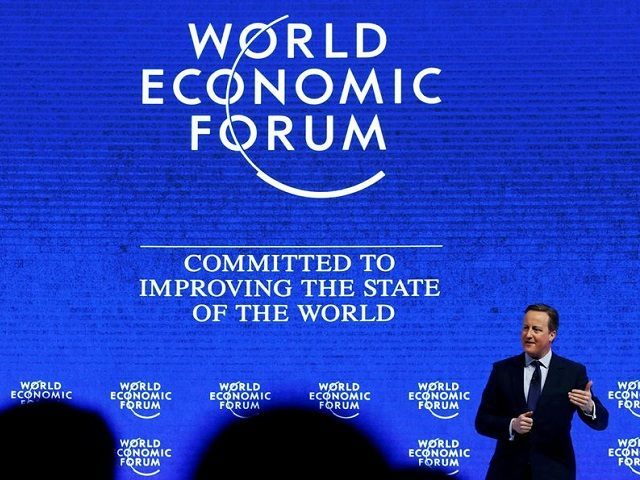The key takeaway from this year’s Davos World Economic Forum was that the planet is on the cusp of a disruptive fourth industrial revolution that must be managed by a collective of leftist elites and their corporate cronies.
A Swiss foundation in Davos has hosted what it calls the “forum for public-private cooperation” for the last 45 years. The three-day event in Switzerland’s eastern Alps brings together 2,500 key leftist politicians, intellectuals, journalists, and a slew of multi-national corporate cronies to discuss shaping global, regional, and industrial agendas to best to divide the economic spoils.
Although Davos’ published goal is “improving the state of the world,” those are often often code words for elites crafting world governance.
Multi-national CEOs, like George Soros, have usually been upbeat about their own prospects. But accounting firm Price, Waterhouse Coopers’ annual poll found that only 27 percent of CEO attendees this year felt optimistic about worldwide economic growth.
The CEOs reported being most anxious about another international financial crisis with no regulatory tools left in advanced countries to fight it. Other top concerns included worries about weak global growth, emerging markets, China’s slowdown, extremely low oil prices, the boardrooms’ gender gap, and the automation of jobs, according to a report by the Financial Times.
Many of the discussion groups focused on World Economic Forum founder Klaus Schwab’s new book, The Fourth Industrial Revolution. Published just ahead of the Davos meeting, the book tries to explain the speed and scale associated with the new disruptive technological breakthroughs in artificial intelligence, robotics, the internet of things, autonomous vehicles, 3D printing, the blockchain and biotechnology.
Schwab defines the first three industrial revolutions as: the 18th century transport and mechanical production revolution; the 19th century mass production revolution, and late 20th century computer revolution.
He asserts that as the world enters the fourth industrial revolution, “The changes are so profound that, from the perspective of human history, there has never been a time of greater promise or potential peril.”
As an internationalist, Schwab worries that the fourth industrial revolution could lead to the disruption of the Davos worldview, which championed emerging market producers and advance nation consumers as the most virtuous strategy to maximize the distribution of global economic benefits.
Schwab writes about the potential abuses from robotics, genetic engineering, and cyber weapons. But his underlying concern is that the new advances in productivity and efficiency from the fourth industrial revolution threaten the continued viability of the trillions of dollars that multi-national corporations have invested in emerging market production. In a de-globalizing world, there is no role for the Davos dream of global governance.
He also bemoans the increase in corporate “creative destruction” that has seen competitive tech-driven innovation slash the average lifespan of corporations listed on the Standard & Poor’s Index from about 60 years to just 18 years.
Traditionally, the large asset base build-up of major corporations assured their business sustainability. But disruptive companies, like Uber in taxis and Facebook in media, now dominate their markets because they are not burdened with paying to own hard assets.
The book argues that the fourth industrial revolution can be managed, if all reasonable stakeholders pull together in the “spirit of Davos”.
Rather than allowing the revolution to “robotise humanity,” Schwab reasons that Davos-inspired global regulatory governance could catalyze a new cultural renaissance and a true global civilization by lifting “humanity into a new collective and moral consciousness based on a shared sense of destiny.”

COMMENTS
Please let us know if you're having issues with commenting.